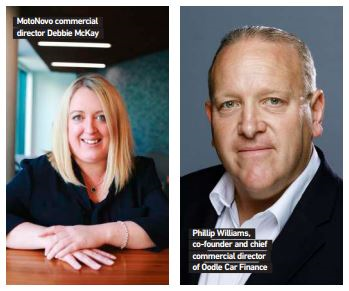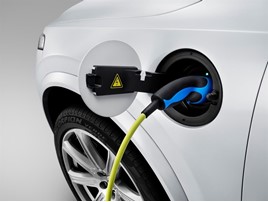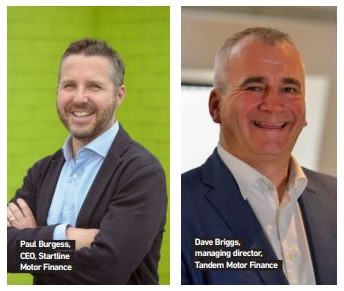A report on the future of finance in dealerships would not be complete without reflecting the views of those at the sharp end. AM asked six automotive retail finance lenders and suppliers for their thoughts.
Providing their opinions are: James Tew (JT), chief executive of e-commerce platform iVendi; Mann Island Finance managing director John Hughes (JH); MotoNovo commercial director Debbie McKay (DMc); Phillip Williams (PW), co-founder and chief commercial director of Oodle Car Finance; Paul Burgess (PB), chief executive of Startline Motor Finance; and Dave Briggs, managing director of newly launched Tandem Motor Finance (DB).
AM: What’s on the motor finance horizon?
JT: Used cars will be controlled by the dealer and new cars by the OEM and that’s a clear change. The agency model will change the outlook further, the new Consumer Duty (see alongside) brings increased regulation while the economic climate is having a negative impact and all this will be playing out over the next few years.
JH: The critical areas of focus for the sector are interest rates, the cost of living crisis and the forthcoming Consumer Duty. In many ways, these are intertwined.
DMc: Dealer finance tends to perform well in tough trading conditions when personal loan access becomes more challenging. The emergence of agency models is likely to see dealer groups becoming even more active in the used market. As a result, I expect volumes and penetration to continue improving.
PB: The market will remain relatively strong, something ensured by ongoing stock shortages, but there will be less overall demand thanks to growing pressure on personal finances. One development is a restructuring of dealer lending panels to take account of this change.
DB: Unsecured loans often become restricted or more expensive in more challenging economic conditions. Car finance's inherent 'security' may enable lenders to be more flexible for people seeking finance.
AM: Will EV ownership and the subscription model change motor finance?
JT: Subscription models haven’t taken off massively, but if OEMs really force the issue and make them very competitive they could take on the traditional funding methods. However, anyone with a PCP (personal contract purchase) deal currently looks in a good position, they have lots of equity in their vehicle so it’s going to take a lot of convincing consumers that there is something better.
 JH: Subscription models may work for new cars, especially in an agency sales world. I am yet to be convinced it is suitable for the used sector. As for EVs, by the end of next year, they are expected to account for nearly 40% of new registrations. At that point, they will be perceived as regular cars with different power methods.
JH: Subscription models may work for new cars, especially in an agency sales world. I am yet to be convinced it is suitable for the used sector. As for EVs, by the end of next year, they are expected to account for nearly 40% of new registrations. At that point, they will be perceived as regular cars with different power methods.
DMc: For me, the Consumer Duty and agency models will have the most significant influence on the finance landscape.
PB: Used EVs are simply more expensive to purchase than ICE (internal combustion engine) cars, a situation that may prove to be permanent. While the products used to buy EVs are probably going to be the same as now, it may simply be that they are bought over a longer period, leading to changes in ownership cycles.
DB: Subscription models may increase, especially with some OEMs moving to an agency model. However, in the used car space, previous attempts have failed to make an impact. And, as the used car sector returns to see stock as a depreciating asset, the risks for lenders are too high for it to operate against point-of-sale finance.
AM: Is the reign of the PCP over and what innovations could we see?
JT: People have had too good an experience with PCPs. PCPs will be around for a long time yet.
DMc: In the used car sector, PCPs have gained momentum. The innovations that I expect will come from fintech applications that seek to enhance retention and product packaging. The battleground ahead will be for customer data.
DB: Claims management companies are actively targeting dealers’ and lenders’ PCPs with accusations of mis-selling. While much of this appears opportunistic, it still creates unwanted work and stress. Re-imagining HP provides a valuable option that can be realised now.
AM: How will the cost of living and interest rate rises impact motor finance?
 JT: We could see a greater decline rate of personal lending and that could benefit the motor finance sector.
JT: We could see a greater decline rate of personal lending and that could benefit the motor finance sector.
DMc: Our data shows that customer indebtedness has been rising across all lenders post-pandemic. Repayment to income has also increased, no doubt fuelled by vehicle price inflation. The increased risk of rising arrears is evident.
PW: We have seen a small increase in the number of people in arrears, and with inflationary pressures set to continue for the foreseeable future, we are expecting the number of defaulters to increase.
DB: The impacts are likely to be twofold – a rise in arrears and more thorough affordability assessments, which may mean that credit will be less readily provided to some applicants.
AM: How have retailers reacted to the FCA’s new Consumer Duty regulations?
JT: Retailers will be very reliant on the lenders and third-party consultants to provide them with solutions. Lenders are having to look at the consumer’s journey but with more undertaken online, lenders need to go far more upstream.
JH: The Consumer Duty is a significant priority for lenders, such as us, and dealers. The FCA clearly expects organisations to start embracing its thinking.
PW: Consumer Duty is essentially a principle which requires firms to act and deliver good outcomes for retail customers. It is a significant change, and it will have a resource implication for dealers.
AM: Will finance remain central to a dealer’s business model with the shifts to online? If so, will dealer finance specialists be necessary?
JT: The sale of add-on products is where the business manager’s expertise will be focused, but finance can be far more automated and prescriptive.
JH: We already see a decline in business manager roles as digital tools compliantly guide consumers through the financing journey. The rapid growth, convenience and control of banking apps represent the type of journey that dealers should be considering.
DMc: I’m sure finance will remain part of a dealer’s model. It will evolve and change, notably by embracing digitisation.
PW: While customers do much of their car research online, nearly all want to visit the dealership to look at the cars in person and to complete the purchase. So long as the quality of the product remains competitive, responsible and helps dealers achieve their business goals, specialist finance will survive into the future.
DB: Motor finance is already well embedded in many car buying journeys and will continue to evolve. Further digitisation is part and parcel of this development.
















Login to comment
Comments
No comments have been made yet.